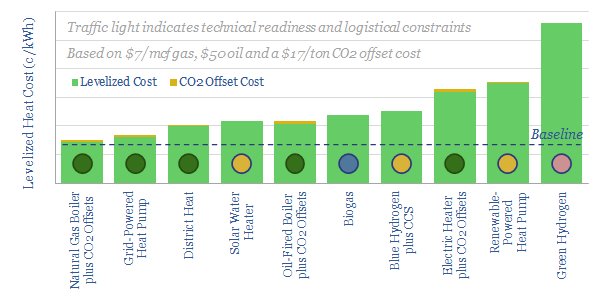Natural gas currently fuels two-thirds of residential and commercial heating, which in turn comprises c10% of global CO2. In this 20-page report, we have assessed ten technologies to decarbonize heat, including heat pumps, renewables, biogas and hydrogen. The lowest cost and most practical solution is to double down on natural gas, alongside nature-based carbon offsets. Global gas demand for heating should continue rising by 3bcfd per year.
Heating’s contribution to global energy demand, gas demand and global emissions is broken out on page 2.
Natural gas currently supplies two-thirds of heating. Different boiler types, their costs and their efficiencies are reviewed on page 3.
Natural gas can be decarbonized with nature-based solutions. The mechanisms and the costs are explained on page 4.
Other incumbents are contrasted on page 5, including oil furnaces and electric heaters, showing how their costs vary with oil, gas and power prices.
Heat pumps can be cost-competitive, if powered from the grid, and our screen of leading heat pump companies is presented on page 6.
Running heat pumps purely off of renewables is not economical. The numbers and the challenges are outlined on pages 7-9.
Solar rooftop heaters can also be cost-competitive in certain contexts, but not in our base case and not at scale (page 10).
Biogas costs are very high, but landfill taxes can act as a kingmaker for these projects, ramping them to c10-20% of developed world gas grids (page 12).
Hydrogen is least economic of the options we considered. Costs and challenges for blue, semi-green and fully green hydrogen are outlined on pages 13-14.
Capturing more waste heat from industrial processes, finally, holds some potential, and we screen numbers on pages 15-16.
Conclusions and impacts for the global gas market are articulated on pages 17-19.
Which gas resources are best-placed to decarbonize heat are summarized on page-20.

